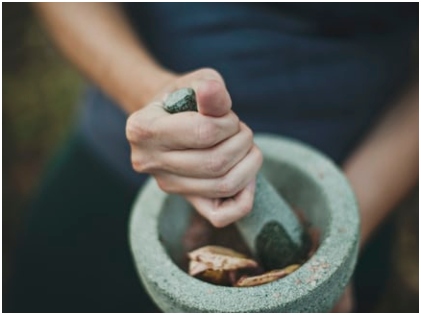
All About Ayurveda: What It Is And How Can It Be Good For You

Ayurvedic medicine is an ancient, holistic form of healing the body that was developed in India over 3000 years ago. Ayurveda rests on the beliefs that the state of health or wellness is dependent on a delicate balance between the spirit, body, and mind. The main goal of this healing system is to promote well-being and not for fighting disease, as is commonly believed. In some instances, Ayurvedic treatments may be geared towards the treatment of specific ailments.
In Ayurveda, it is believed that everything is connected – every component of the universe, whether it is a living or non-living component, has a connection. With a mind, body, and spirit that is in harmony with the greater universe, it is believed that your health will be good. It is from a disruption in this balance when sickness enters. There are many ways for this balance to be disrupted, from birth defects to injuries and your environment, or even emotions, and more.
 Practitioners of Ayurveda are of the strong belief that each individual is composed of five basic elements – air, fire, space, water, and earth. It is believed that the combination of these elements forms three life forces in the body, and the name of these life forces are ‘doshas’. Doshas are believed to control how the human body operates. The three doshas are ‘Vata dosha’ for space and air, ‘Pitta dosha’ for fire and water, and ‘Kapha dosha’ for water and earth.
Practitioners of Ayurveda are of the strong belief that each individual is composed of five basic elements – air, fire, space, water, and earth. It is believed that the combination of these elements forms three life forces in the body, and the name of these life forces are ‘doshas’. Doshas are believed to control how the human body operates. The three doshas are ‘Vata dosha’ for space and air, ‘Pitta dosha’ for fire and water, and ‘Kapha dosha’ for water and earth.
It is further understood by believers of Ayurveda that each individual inherits a unique combination of these three doshas. In each person, there is usually one dosha that is stronger of the three. Since each dosha controls different body functions, understanding what your strong and weak doshas are is an important part of Ayurveda.
Vata Dosha
Ayurveda practisers are of the belief that the Vata dosha is the most powerful of the three doshas. This dosha is responsible for controlling basic functions in the body, like the division of cells, breathing, circulation of blood, ridding of waste and even your mind. Disurptintion of this dosha is through eating too frequently, sleeping too late at night, or even fear or grief. If this dosha is your strongest life force, then you are susceptible to develop asthma, skin problems, anxiety and arthritis, and related diseases.
Pitta Dosha
 This life force is responsible for controlling your metabolism and digestive system, as well as the hormones related to your appetite. Disruption of this dosha occurs when a person eats too much spicy or sour food, or when they sit in the sun for too long. If this dosha is your strongest life force, you are thought to be more susceptible to conditions like high blood pressure, heart disease, Crohn’s disease, and infections.
This life force is responsible for controlling your metabolism and digestive system, as well as the hormones related to your appetite. Disruption of this dosha occurs when a person eats too much spicy or sour food, or when they sit in the sun for too long. If this dosha is your strongest life force, you are thought to be more susceptible to conditions like high blood pressure, heart disease, Crohn’s disease, and infections.
Kapha Dosha
This life force is responsible for the control of muscle growth, your weight, immune system, body strength, and stability. This life force is disrupted by taking naps during the day or by consuming food high in sugar, salt, or water. It is believed that if this is your dominant life force, you are susceptible to developing diabetes, cancer, breathing disorders, obesity, and nausea after you eat.
When you partake in Ayuverdic treatment, your practitioner will identify your strongest life force and will develop a treatment plan specifically for you. This plan will take into account your unique emotional and physical elements, your dominant life force, and the balance of the elements in your body.
The treatment goal is actually to cleanse your system of any waste which can lead to developing an illness. There is a name for the cleansing process – ‘panchakarma’. It is a process to restore harmony in the body and restore the balance between the elements. Treatment can include blood purification, laxatives, medical oils, enema or massage.
 Ayurvedic medicine is not a regulated practice and it is not approved by medical bodies or standards. There have been warnings that 20% of Ayuverdic medicines have been found to contain toxic components like mercury, arsenic, and lead. For these reasons, it is best to consult a professional before administering any Ayurvedic medicine. A visit to your doctor will clear up the risks, if any, and help you make an informed decision as to whether Ayuverdic treatment is a suitable option for you.
Ayurvedic medicine is not a regulated practice and it is not approved by medical bodies or standards. There have been warnings that 20% of Ayuverdic medicines have been found to contain toxic components like mercury, arsenic, and lead. For these reasons, it is best to consult a professional before administering any Ayurvedic medicine. A visit to your doctor will clear up the risks, if any, and help you make an informed decision as to whether Ayuverdic treatment is a suitable option for you.
More in Treatment
-
`
5 Reasons Why Dad’s Side of the Family Misses Out
Family bonds are intricate and multifaceted, often creating a unique tapestry of connections. However, many people notice a peculiar trend: stronger...
July 12, 2024 -
`
A Quick Guide on How to Get Short-Term Disability Approved for Anxiety and Depression
Living with anxiety or depression poses unique challenges, particularly in the workplace, where stress can exacerbate symptoms. For many, short-term disability...
July 5, 2024 -
`
Why Do People Feel Sleepy After Eating?
Is feeling sleepy after eating a sign of diabetes? Well, not directly. There are many reasons why you feel drowsy after...
June 20, 2024 -
`
What Is High-Functioning Depression? Symptoms and Treatment
High-functioning depression may not be a term you hear every day, but it’s a very real and challenging experience for many....
June 13, 2024 -
`
Kelly Clarkson’s Weight Loss Ozempic Journey – Debunking the Rumors
In a refreshing moment of transparency, Kelly Clarkson, the beloved singer and talk show host, sheds light on her remarkable weight...
June 3, 2024 -
`
What Is the Best Milk for Gut Health and Why?
In recent years, the milk section at the grocery store has expanded far beyond the traditional options. While cow’s milk has...
May 30, 2024 -
`
Do Dental Implants Hurt? Here’s All You Need to Know
When you hear “dental implants,” you might wince at the thought of pain. But do dental implants hurt as much as...
May 24, 2024 -
`
5 Key Differences Between A Psych Ward & A Mental Hospital
Curious about the differences between a psych ward and a mental hospital? You are not alone. With the mental health conversation...
May 16, 2024 -
`
It’s Official! “Selling Sunset’s” Christine Quinn & Husband Christian Dumontet Are Parting Ways
Have you ever found yourself unexpectedly engrossed in the personal lives of celebrities, especially when their stories take dramatic turns? Well,...
May 9, 2024










You must be logged in to post a comment Login